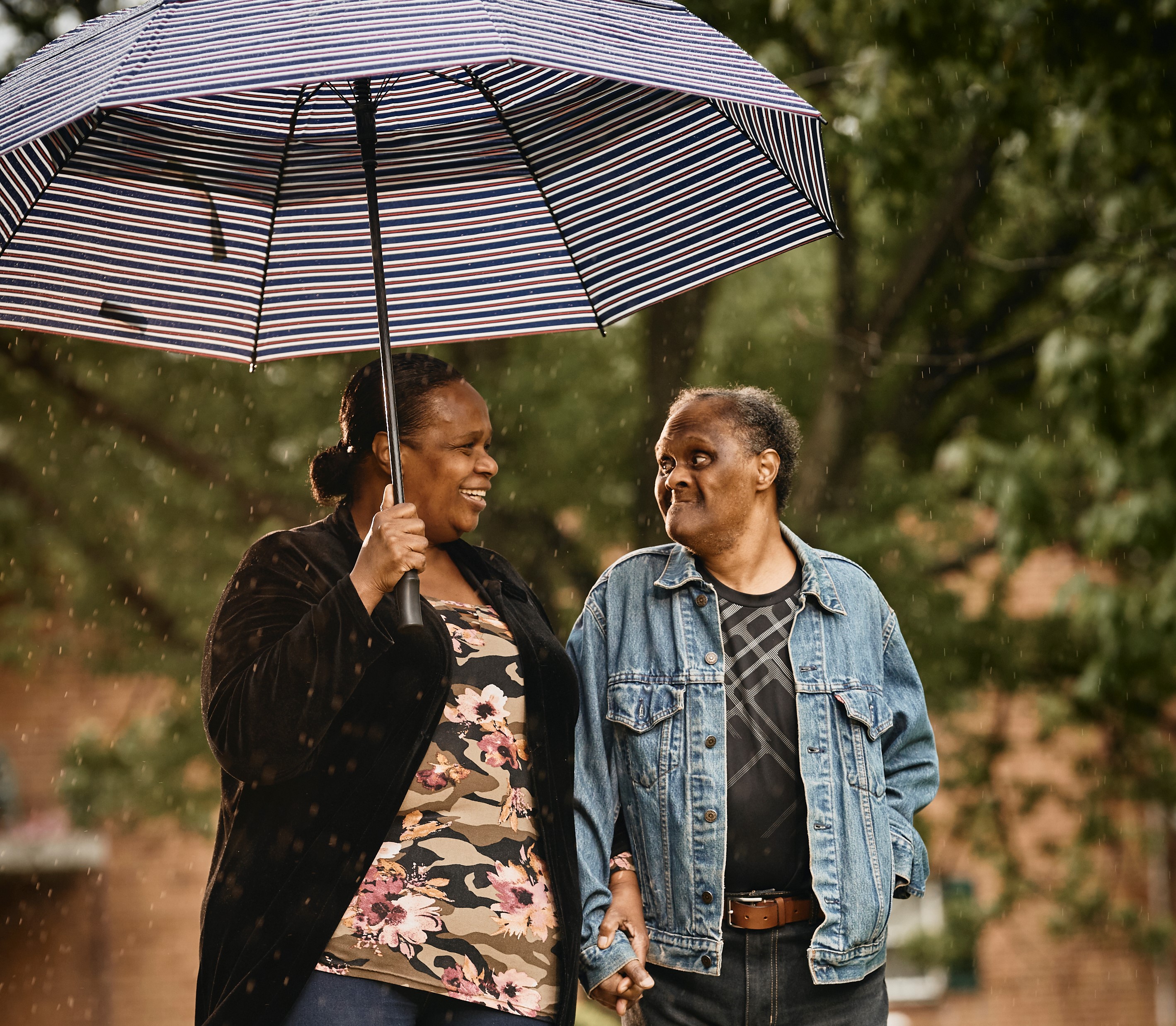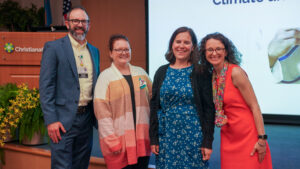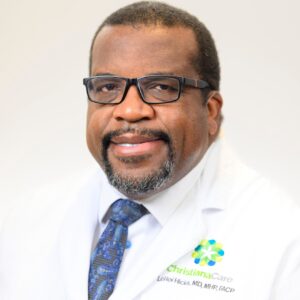Carol Spellman of Wilmington, Delaware, found it unusual when her brother started stumbling. In caring for Charles Keith, her 62-year-old sibling who has Down syndrome, Spellman recognized the symptom as new. Keith’s primary care doctor, Daniel Hurley, D.O., at the Rocco A. Abessinio Family Health Center at Wilmington Hospital diagnosed cataracts in both his eyes. Fortunately for Keith, help was a few steps away — at the newly renovated Wilmington Ophthalmology suite.
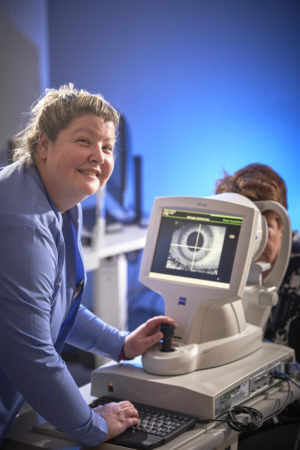
In the expanded space, caregivers continue nearly a century of providing expert, respectful care including cornea transplantation, cataract surgery, detached retina repair and treatment for glaucoma and macular degeneration, among other conditions.
A visionary collaboration
Ophthalmologists work closely with their patients’ primary care providers (who, like Dr. Hurley, often serve at the Wilmington Health Center) to diagnose and treat eye symptoms efficiently.
“I thought that my brother was having problems walking,” said Spellman, who has been caring for him since their mother died 10 years ago. “I didn’t associate it with him not being able to see very well.”
At Wilmington ophthalmology, Keith had successful surgery to remove his cataracts.
With his vision restored, Keith’s gait improved.
“At Christiana Care, everyone was wonderful, from before the surgery to aftercare,” Spellman said.
The partnership and care coordination between primary care and ophthalmology “allows us to give the right care, at the right time, in the right place,” said Cydney T. Teal, M.D., leader of the Primary Care and Community Medicine Service Line and chair of Family and Community Medicine. “With an important combination of services accessible to all, we are making a positive impact on the health of our community.”
The foresight to pay it forward
This continuity of services has a long history at Christiana Care. Twenty years ago, when Pecos T. Olurin, M.D., joined Christiana Care’s Medical-Dental Staff, he also volunteered additional time to care for underserved patients at Wilmington Ophthalmology.
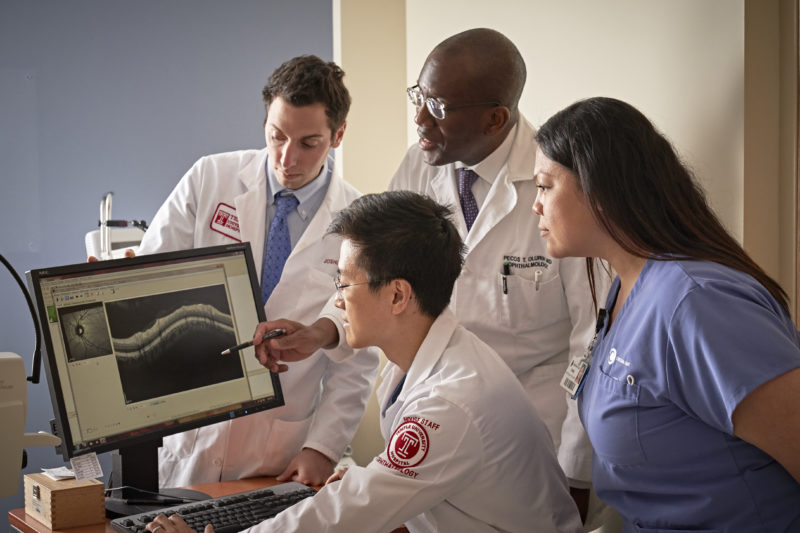
“At the time, it was a requirement of section membership to volunteer monthly for the first 25 years of service,” said Olurin, the Ophthalmology section chief. “The entire premise is that no one in our community would be without quality eye care.”
Ophthalmologists continue to serve in the center to ensure patients receive “same quality care they would get in our offices” at the clinic. Dr. Olurin said. “Over the years, our ophthalmologists have saved sight for hundreds of people and given better quality of vision back to thousands.”
This tradition of service has long appealed to ophthalmologist Michael Vincent, M.D., who followed in his father’s footsteps to specialize in eye care and serve patients in the ophthalmology clinic.
“Wilmington Ophthalmology is a perfect example of accessible care,” he said. “The care is there whether someone has money or not, whether someone has insurance or not. No one is turned away.”
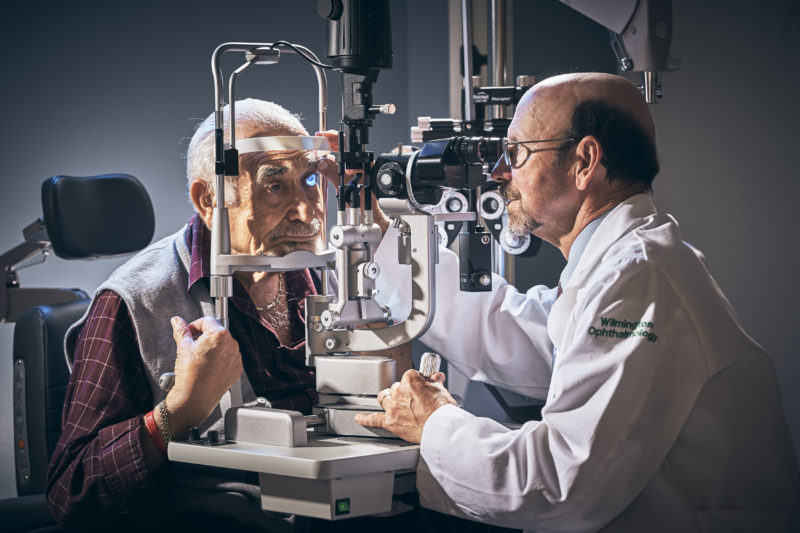
Looking ahead
The ophthalmologists also play an important role in training the caregivers of tomorrow. The clinic, open five days a week, has a longtime relationship with the Lewis Katz School of Medicine at Temple University, giving residents the opportunity to see a wide variety of patients in a robust practice.
On any given day there are patients with eye injuries as a result of an accident or other traumatic event. There are patients with eye infections and some who come regularly to get injections for macular degeneration.
More than 10 years ago, Theresa Freeman of Wilmington began regular visits to Wilmington Ophthalmology so doctors could monitor her vision.
She takes a medication that can damage the eyes, so checkups are important. But the ophthalmologist who examined her discovered another serious health problem.
“They could tell by looking at my eyes that I have type 2 diabetes,” she recalled. They connected Freeman with a primary care provider immediately.
“When we serve together — as we do with our partners in Wilmington Ophthalmology — we advance the health of our community in the most valuable ways,” said Dr. Teal.
Paula Ko, M.D., a retina surgeon, trained at the clinic when she was at Temple in the 1990s. She said it was a valuable experience on her career path.
“We saw macular degeneration and interesting, diverse cases,” she says. “We worked with highly experienced nurses and doctors who really knew the patients and ensured that there was tremendous continuity of care.”
A few years after she completed her retina fellowship, Dr. Ko returned, taking over the practice of a retiring retina specialist who had mentored her at the clinic.
“I am paying back to the clinic where I received my training,” she said.
